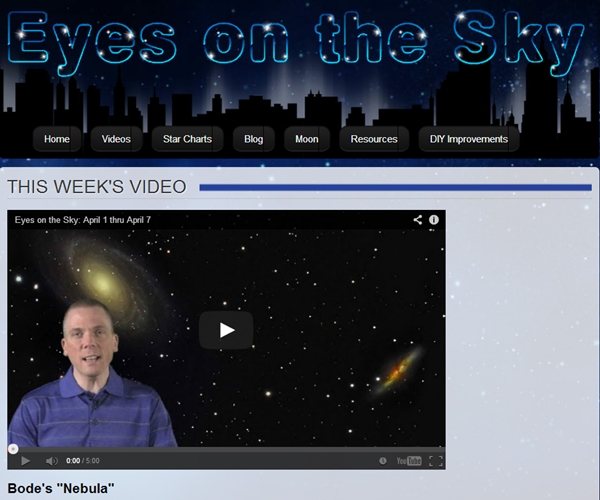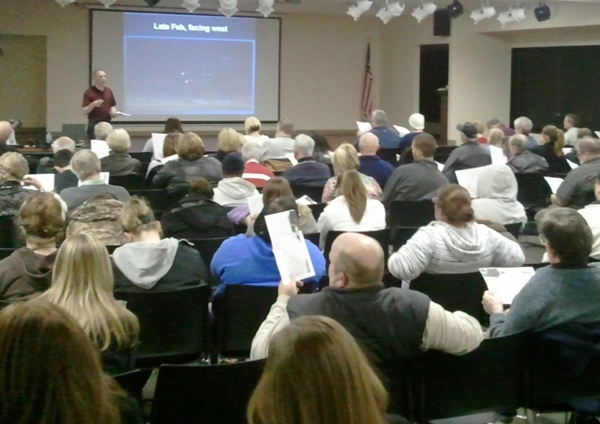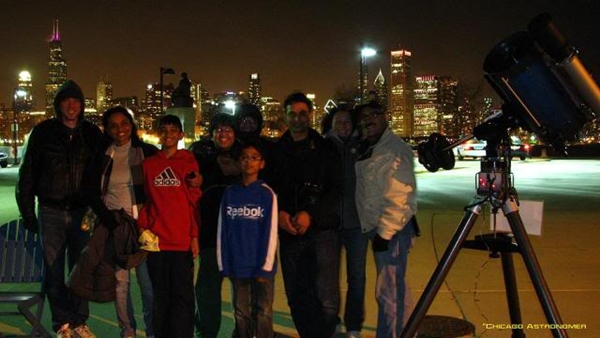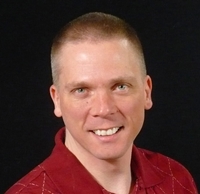Report
by David Fuller
Ask any random person what “light pollution” or means, and the odds of you getting a correct response from a non-astronomer is pretty slim. It just isn't on the radar of the average person. But placed into context, “Do you know why you can't see the stars at night?” or “Does light shining into your window at night keep you from sleeping?” then the response often changes significantly. People understand those concepts, but what they need is an incentive to change their own behavior.
That is a huge challenge, but it is not impossible. How? Make it important to THEM.
First, we as amateur astronomers are the ones who know this issue best – almost all of us deal with it every time we observe. So what are we doing about it? Regrettably, many of us only complain about it, and do not do much about it. That has to change. More of us need to be engaged. Even if it is only for an hour a month.
It's not enough to send $35 to the International Dark Sky Association every year, and conclude, “Well, I did my part.” We all need to do that anyway (or give to a local light pollution reduction organization), and also do more. I can hear you muttering, “Okay Dave, but what are YOU doing about light pollution?”
Great question!
Back 2008, I stopped being a “complainer,” and started writing an astronomy column in my local newspaper. I called it “Eyes on the Sky.” Sadly, after about a year, the column was canceled, and “Eyes on the Sky” languished for a while. Having a degree in Theater and Communications, I decided to make a video about how to align an equatorial mount that would be easy for people to understand. So I took what little equipment I had at the time, and made my own video describing it. At that time, my wife suggested that I make my articles into video format, and the video version of “Eyes on the Sky” was born. I mention light pollution in every video, yet the bulk of each video was (and still is) about what people could find in the night sky. Why? That's what is important to the viewers, and I get to talk about light pollution to them every week. From 2010, Eyes on the Sky has grown today to 350,000+ video views, and closing in on 3,000 subscribers on YouTube alone!
 Homepage of the author's website in early April 2013
Homepage of the author's website in early April 2013
That may not seem like much - and maybe it isn't compared to funny cat videos – but here is the point: I'm reaching people, and importantly, repeatedly. I'm educating about an issue that is important to me (light pollution), while sharing information others want to learn (the night sky). But that's not all: I do library presentations too. I have a 45 minutes long astronomy talk that guides absolute beginners through the basics of stargazing, so they can start identifying bright stars and constellations in the sky that night. And guess how I end each talk?
You guessed it: Light pollution.
Now certainly, these all play to my strengths: As a communications/theater major, I actually LIKE getting up in front of people. To me, being nervous is a good thing – it's a adrenalin! I look forward to it. That may not be you – and that's okay. You can do something different.
But the point is this: Figure out what IS your strength, and then approach it from there.
 David Fuller presenting how to understand the night sky at a local library. Over 100 people attended this presentation.
David Fuller presenting how to understand the night sky at a local library. Over 100 people attended this presentation.
Did you know you have help? The International Dark Sky Association has many printable pamphlets on their website. Now, I don't recommend you just print them and hand them out on a street corner. The goal is to get people on our side, and the best ones will be those who already have interests aligned with ours. Who might that be? Birders have an interest in reducing light at night; lights in tall buildings at night can confuse – and sometimes kill - our flying, feathered friends. What about those who are interested in saving baby turtles? Know anyone who doesn't sleep well? It could be too much light at night, reducing melatonin production. Do you know anyone over the age of 60 that actually likes to drive at night? Ask them why they don't – they'll probably tell you it's the lights. Do you know how we reduce / minimize that problem for seniors?
You got it: Reduce glare and shield poor lights at night. That reduces light pollution too!
See where I'm going with this? There are those whose interests are aligned with ours – we just need to find them, make friends with them, and share our passion (and let them share theirs with us!) – and talk about light pollution reduction. And on that point, maybe astronomy outreach is for you. My friend Joe Guzman is the “Chicago Astronomer.” He sets up a telescope outside the Adler Planetarium on warm nights throughout the year and shares the night sky with passers-by. Do you know how far the Adler is from downtown Chicago, one of THE worst light polluted cities on the planet?
Less than a mile!
Why would we do astronomy outreach so close to a major city light that? Why not?! Yes, galaxies and globular clusters are nearly invisible. But planets, the Moon and some open clusters still shine through, and for those who engage us further in conversation, light pollution is a topic we can discuss.

The author, at far left in this photo, poses with visitors and Chicago Astronomer Joe Guzman at far right, at the Adler Planetarium in front of the Chicago skyline.
And that's the key: Educate others about light pollution, and help make it not sound scary to people. (“It's just aiming lights down towards the ground, where we all are anyway.”) Learn to be comfortable talking about light pollution. Don't know where to find information? Watch old “Eyes on the Sky” videos – there's a “Dark Sky Fact” in most every one. Visit darksky.org, or illinoislighting.org, or this blog here at AWB. Another option is to go local: Change your own lights – even if you leave them off at night anyway. I added shields to some floodlights I have on my house, and changed an old light to a new, downward facing one. The cost to replace both was only $45! And, I could lower the wattage used in my floodlights to half the originals, so the fixture costs half as much to use.
Remember, the key to making a change is to make this issue - which is important to you - important to others. Give them a REASON to make the change – not just because you said so. Make an emotional connection. Talk about breast and prostate cancer. Mention how too much light at night negatively affects sleep. Discuss how reduced glare enhances safety. Hit on the environmental, or energy savings points. What appeals them? Find out, and talk about it. You won't convert everyone right away. But over time – you just might.
Approach the issue from your own strengths, learn from your mistakes, and importantly: Never give up! This will be a long struggle. But we can do this. It's just going to take more of us speaking up. And here's the best part:
We have ALL of the good facts on OUR side!
I spend, on average, 10 to 12 hours making “Eyes on the Sky” videos every week, not including any presentations or outreach that I do. Is it worth one hour of your time every month to make that difference? It is estimated that light pollution increases by 6% every year. We need that to be at 0% before it will ever get better.
Commit to making a difference today.
###
 David Fuller is a dark sky activist who has been producing weekly and other 'how-to' astronomy videos since 2010, along with engaging in astronomy outreach, to raise awareness of light pollution through informal night sky education. With over 100 videos to his credit and a growing audience, he is hopeful we can halt the advance of light pollution by the end of this decade.
David Fuller is a dark sky activist who has been producing weekly and other 'how-to' astronomy videos since 2010, along with engaging in astronomy outreach, to raise awareness of light pollution through informal night sky education. With over 100 videos to his credit and a growing audience, he is hopeful we can halt the advance of light pollution by the end of this decade.
My Recent Reports
Contact
| Location: | Sri Lanka  |
|---|---|
| Website: | thilinaheenatigala.blogspot.com |







Comments